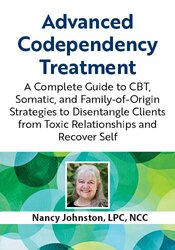
Sujets d'actualité :
×

Trapped in patterns of fixing, pleasing, or managing everyone around them, codependent clients come to your office, anxious, depressed and in seriously unhealthy relationships.
But sessions are tough as they continually steer the conversation back to someone else – the fear of looking inward pushing them to retreat into the familiar territory of putting others first and themselves last.
If you’re not careful you can end up joining them in trying to solve the problems of others, missing chances for self-discovery and healing.
That’s why recognized codependency expert and author, Nancy Johnston, LPC, created this training – to give you the tools to help your clients develop a deeper understanding of themselves, establish healthier boundaries, and foster more authentic and fulfilling connections with others!
Vous obtiendrez :
This is the step-by-step guide for taking clients from codependency to self-recovery. Packed with assessment tools, specific interventions, skill building exercises, case studies and more, there has never been a better chance to get tangible, life-changing results for your clients.
PLUS, you get The Clinician’s Codependency Treatment Workbook FREE when you register!
Achetez aujourd'hui !
Tous les membres du comité de planification de PESI, Inc. ont divulgué leurs relations financières avec des organisations non éligibles et toutes les relations non financières pertinentes avant de planifier le contenu de cette activité. Aucun des membres du comité n'avait de relations financières pertinentes avec des entreprises non éligibles ou d'autres relations potentiellement biaisées à divulguer aux apprenants. Pour les divulgations sur Conférenciers , veuillez consulter la biographie de la faculté.
Des informations sur les crédits de formation continue seront bientôt disponibles pour ce kit d'auto-apprentissage non interactif.
Des crédits de formation continue peuvent être disponibles pour certaines professions, comme indiqué dans le public cible. Les heures dépendront de la durée réelle de l'enregistrement. Veuillez vérifier les exigences spécifiques auprès de l'organisme d'agrément de votre État ou de votre organisation.
Des frais supplémentaires peuvent être facturés pour les certificats de formation continue. Veuillez contacter notre service clientèle au 1-800-844-8260 pour plus de détails.
**Le matériel inclus dans ce cours peut inclure des interventions et des modalités qui vont au-delà de la pratique autorisée de votre profession. En tant que professionnel agréé, vous êtes responsable de l'examen du champ d'application de la pratique, y compris des activités qui sont définies dans la loi comme dépassant les limites de la pratique, conformément aux normes de votre profession et dans le respect de celles-ci.

Nancy L. Johnston, MS, LPC, LSATP, MAC, NCC, est une conseillère professionnelle agréée et une praticienne autorisée en traitement de la toxicomanie en pratique privée à Lexington, en Virginie, aux États-Unis. Avec 48 ans d’expérience clinique, Nancy est conseillère en toxicomanie et diplômée de l’American Mental Health Counselors Association (AMCHA) en toxicomanie et troubles concomitants.
Elle est l’auteure de trois livres sur la codépendance - deux publiés par Central Recovery Press : Disentangle : When You’ve Lost Your Self in Someone Else 2nd Edition (2020) et My Life as a Border Collie : Freedom from Codependency (2012) et le troisième publié par PESI Publishing : The Clinician’s Codependency Treatment Workbook (2024).
Nancy a deux séminaires numériques produits avec PESI pour les cliniciens sur le traitement de la codépendance : « Codépendance : stratégies de traitement pour les clients qui se perdent dans les autres » (2020) et « The Codependency Treatment Guide : CBT, Somatic Strategies and More to dissentangle Clients from Dysfunctional Relationships and Recover Self » (2022).
Nancy offre des ateliers de rétablissement en ligne et prend plaisir à concevoir et à animer le camp de codépendance deux fois par année en personne sur un site de retraite en Virginie. Le camp de codépendance est en activité depuis 2004.
Au cours des 25 dernières années, Nancy a fait des présentations lors de nombreuses conférences, notamment le symposium de Cape Cod sur les troubles addictifs, la Carolinas Conference for Addiction and Recovery, Addiction : Focus on Women, le Virginia Summer Institute for Addiction Studies, la conférence annuelle de l’American Mental Health Counselors Association, la conférence annuelle de la Virginia Counselors Association, la formation spécialisée pour la Cour suprême de la Virginie, et le Symposium des réseauteurs de psychothérapie 2025.
Plus d’informations sur Nancy et son travail sont disponibles sur son site Web : https://www.nancyljohnston.com/
Conférenciers Divulgations :
Finances : Nancy Johnston exerce en cabinet privé et est entrepreneure indépendante chez Dr. Kuley and Associates. Elle reçoit des redevances en tant qu’auteure publiée. Nancy Johnston reçoit des honoraires de conférence du Virginia Summer Institute for Addiction Studies. Elle reçoit des honoraires de conférences et des redevances d’enregistrement de Psychotherapy Networker et de PESI, Inc. Elle n’a aucune relation financière pertinente avec des organisations non admissibles.
Non financière : Nancy Johnston est membre de l’American Mental Health Counselors' Association, de la Virginia Counselors' Association, de la National Association of Alcohol and Drug Abuse Counselors et de la Virginia Association of Addiction Professionals.
Consultez notre page FAQ à l'adresse https://www.pesicanada.ca/faq ou contactez-nous à l'adresse https://www.pesicanada.ca/contact-us.
L'accès à ce produit n'expire jamais.
Accueil et évaluation des clients présentant des comportements codépendants
Establish a Therapeutic Relationship with a Codependent Client
Psychoeducation and Early Sessions
Family of Origin and Parts Work to Help Clients Understand their Codependent Characteristics
Somatic and Cognitive Techniques to Enhance Codependent Clients’ Awareness of Body, Mind, Emotions, and Spirit
Skills to Transform Shame, Manage Guilt, Be Assertive, and Set Healthy Boundaries
Exercises and Practices That Help Clients Learn How to Count on Self
Make Self-Recovery a Way of Being
Applications cliniques
Garantie de satisfaction
Votre satisfaction est notre objectif et notre garantie. Les questions doivent être adressées à info@pesicanada.com.
Veuillez patienter ...